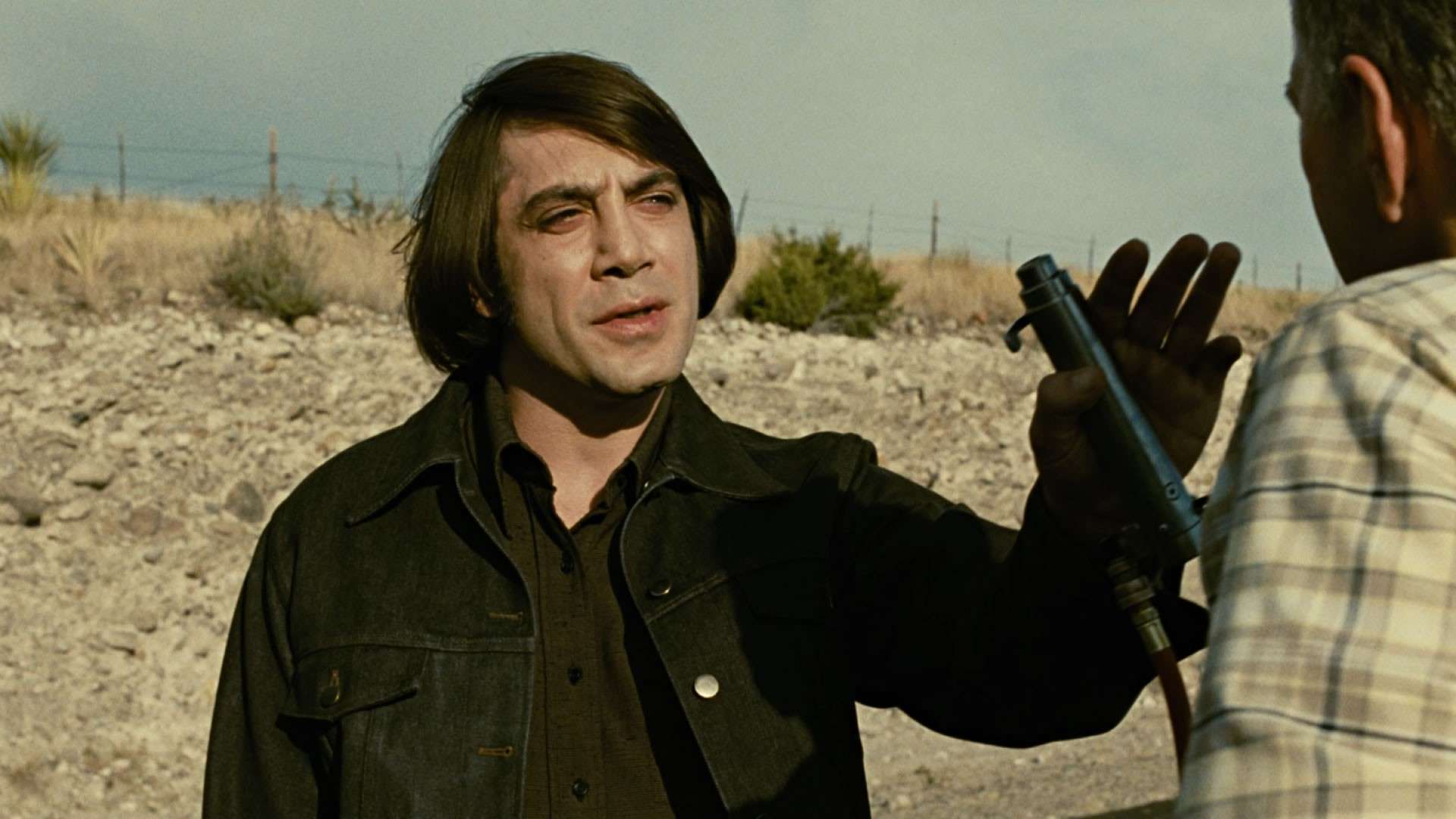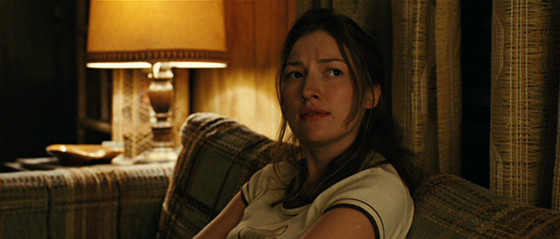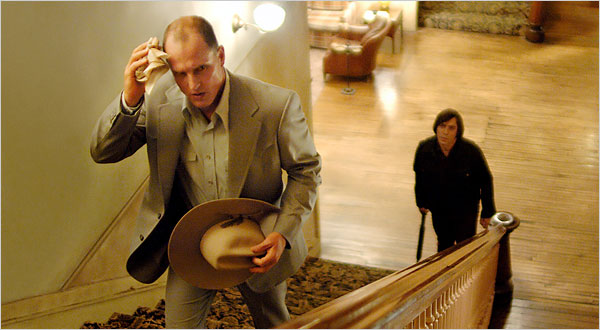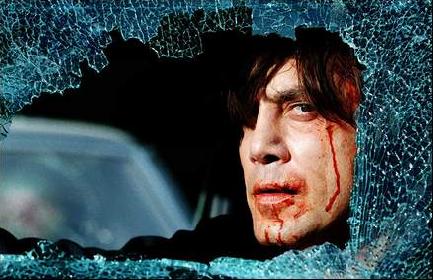6. Chigurh’s dialogues with his victims

The first dialogue that Chigurh has in the movie is the one with a gas station proprietor, who was supposed to be his victim, but evaded death. Chigurh intends to kill the gas station proprietor, who seems confused, scared, and “blabbers” without much sense. In the novel, it is almost dark during their dialogue, while in the film it is high noon.
This shows the absurdity of the gas station proprietor’s statement that he should see about closing. He falsely tries to be likeable and polite, and Chigurh sees it as a posture of a man who leads an utterly meaningless life, without a second of self-examination. He says to him: “You don’t know what you are talking about, do you?” Chigurh tries to evoke in him the need to reexamine his life, but it seems implausible that it will happen, even after he evaded death. He might try to contemplate what happened, but the deeper understanding that Chigurh tries to accomplish will probably be lacking.
The second and the third dialogues are with Carson Wells and Carla Jean. Both of them call Chigurh “crazy”. If Chigurh was “crazy”, it is because of his “ratio”, his principles. During the dialogue with Wells, he tells him: “You should admit your situation. There would be more dignity in it.” Wells tries to elude death, although he knows it is hopeless. He clings to life, but his life escaped him long ago.
Chigurh highlights: “If the rule you followed brought you to this, of what use was the rule?” He points to him that the whole life he led brought him to that very moment. Obviously he did not lead his life reflecting on himself and things around him. His vanity, as Ellis points out, “hubris”, brought him to an easy capture and death.
Chigurh murders Carla Jean not because she did anything wrong to him, but because he promised it to her husband. In Chigurh’s eyes, Llewelyn sacrificed her because of himself. Llewelyn did try to save them both, but in the world of “No Country for Old Men” that was impossible. His death was inevitable. Chigurh believed that because of Llewelyn’s moral weakness, she must die. Carla Jean is the first of Chigurh’s victims that admits her situation.
In the novel it is expressed clearly, in the movie with more subtlety. At first, she refuses to accept the coin toss; she says that it is Chigurh who decides, not the coin. He replies: “I got here the same way the coin did.” In other words, the causal chain that brought him there, brought the coin as well. Both of them serve the same purpose, that is, to kill Carla Jean. Unlike Carson Wells, she dies with dignity.
7. Determinism; absence of free will

Events that happen in the movie are based on choices, but they are hardly choices based on free will. When a car hits Chigurh’s vehicle at the end of the film, it can be seen as a chance or a necessity; it is irrelevant whether the former or the latter is the case, as both phenomena show that there is no free will or rational plan behind events.
When Chigurh tells the gas station proprietor that he married into his position in life, he meant that his marrying and living in that house was not an act of will. Just the opposite, it was not reflected upon; he just happened to be there by the act of marriage.
According to active self-determinism, which Aristotle advocated, by being critical of ourselves and self-aware we can choose regardless of our conditioning. This theory opens up space for rationality and a degree of freedom, but also acknowledges that causes for action exist.
The only two characters who practiced that are Carla Jean at the end of the movie and Chigurh himself. The others, including Llewelyn, were caught up in the forces their choices provoked; for Llewelyn, it was keeping the money. In other words, they were caught up in the causal chain of events that led to their devastation or death.
8. Meaningless chain of events

From the beginning to the very end of the movie, the whole chain of events that started with shooting at antelopes is, concerning most of the characters, completely meaningless. Most of them, except Carla Jean, who came to the realization about the necessity of her death, have not reached no higher goal, no “telos”. All the characters ended up far worse than in the beginning – dead or devastated, while Chigurh walks away with a bone sticking out of his arm.
There is no meaning to the suffering and life journeys of the characters. Ed Tom Bell is an interesting example. Although he has a loving wife, he fails to cope with the world; he is defeated. One may argue that Chigurh is a character who creates a new meaning in a world devoid of it, but his agenda is destruction. Although he may try to help his victims reach self-awareness, at the end of the day they stay just that – his victims.
9. Incapacity to comprehend violence and suffering

Nietzsche wrote that it is not suffering that is unbearable to men, it is meaningless suffering. When someone sees other people suffer and asks himself why it happens, but there is no answer, the void fills his heart. That happened to Ed Tom Bell; he is devastated because he can’t understand, let alone prevent suffering and violence.
He does not understand the motives behind what he considers evil, as his own morality cannot give him answers. This failure to comprehend violence is existent within Carla Jean as well. She cannot understand why she needs to die because of her husband’s mistake.
For want of a better explanation, she calls Chigurh crazy. This lack of understanding is the main drive behind nihilism; if we cannot understand the world around us, our values can’t give us useful explanations, and we lose our ground and our last resort – hope, which Bell wants to have. This is portrayed in his dream in which he sees his father carrying a torch at the end of the movie.
10. Impossibility of salvation

On the blog Movies and Philosophy Now, Christopher Barr writes: “No Country for Old Men approaches the Divine Comedy from a… tragic trajectory – backwards. Ed Tom is the beacon of hope here… Llewelyn is in purgatory and Chigurh is the manifestation of inferno.”
There is no salvation, and Ed Tom is aware that if he continues to do his job he must give up his soul. This is expressed in Bob Dylan’s song “Knockin‘ on Heaven’s Door”, which is about a policemen who refuses to kill in his line of duty because he believes that this makes salvation impossible.
“Mama put my guns in the ground/I can’t shoot them anymore./That long black cloud is comin’ down/I feel I’m knockin’ on heaven’s door.” Niccolo Machiavelli said that if you want to follow the path of salvation, you must stay away from politics; the same is with bloody business that occurs in this movie.
Llewelyn’s path from purgatory to hell is linear, and things for him become only worse. In the end, he dies as he predicted: taking the money and starting a chain of events that led to the murder of his wife as well. The world of “No Country for Old Men” is a nihilistic version of “Divine Comedy”; there is no third part, no “Paradiso”.
Author Bio: Hrvoje Galich is a student of political science and writes expressionist poetry. He believes that Tristan und Isolde is the most beautiful artistic piece in the history of man. He loves movies by Andrei Tarkovsky, Michelangelo Antonioni, Ingmar Bergman and Shohei Imamura. He adores his cat “Meow”, the only cat in the world that can say her name.